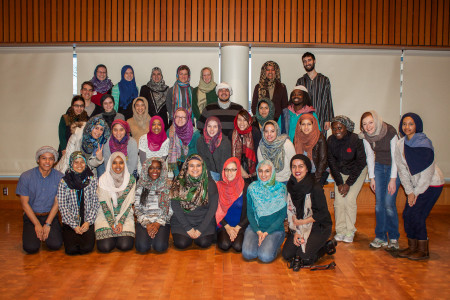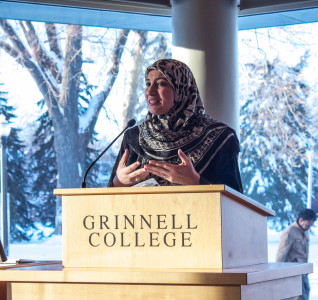The first Multi-Religious Awareness Week began this week on Monday, Feb. 2 and featured a wide series of campus activities, panel discussions and other activities focused on addressing issues concerning religious tolerance on campus, Islamophobia and the role of women in the Islamic tradition. The symposium, which is sponsored by the Center for Religion, Spirituality and Social Justice, will run through Sunday, Feb. 8.
The main purpose of this week was to open the dialogue about religious diversity in the Grinnell community. Rabbi Rob Cabelli, who is also an Associate Chaplain, explained the importance of these activities in the context of the Grinnell community.
“I think religious intolerance is a problem in the Grinnell community. From talking with students, I have learned that sometimes they feel shut down from expressing their faith when talking with other students or in a classroom settings,” he said.

Photo by Sarah Ruiz.
The week kicked off with a student panel in JRC 101, which included representatives from multiple religious groups on campus discussing their experiences regarding religious tolerance at the College. Some panel members explained that while they were not outright attacked for their religious background, they often felt uncomfortable with what they perceived as a willful ignorance on the part of students in refusing to learn about others’ religious beliefs.
“No one is attacking me for being religious, far from that. However, on the other hand, [most] of the campus does not care about learning from other religious. I believe that one of the purposes of Grinnell College in bringing religious diversity is to expose students to different ways of thinking, but once they are here nothing is done to actively integrate them [with] the community,” said Strahinja Matejic ’17, who identifies as an Eastern Orthodox Catholic.
“I believe there is no open dialogue about religion,” said Rachel Aaronson ’17, who identifies as Jewish. “The panel was a good way to start the conversation … we were able to share stories and experiences.”
Mari Holmes ’17, who identifies as a Muslim, stated that she believes the problem stems from the tendency of many liberal arts institutions to seek distance between themselves and religious institutions.
“I believe the problem is the way people view the concept of the ‘liberal arts’ because we are told we should back away from this oppressive ideological institutions and I find that religion has such a negative connotation and there is no dialogue,” she said.
On the other hand, Holmes added that she actively experiences religious intolerance, which she says is present in the everyday life of some students.
“For example, the Halal station—people have blatant disrespect for the Halal station,” Holmes said. “There are members of our community that cannot eat meat if it is not Halal and it is unfair they cannot have meat just because other Grinnellians do not want to wait in line for the plat du jour. I mean, people check each other when it comes to gluten-free, so why not in Halal?”
The second major event of the week, a talk by Suzy Ismail, a Muslim author, speaker and scholar, took place on Thursday at 4:15 p.m. in JRC 101. During the talk, called “Why am I a Muslim?,” she discussed how in the 21st century, Islam has developed negative connotations because of extremist groups that ignore many Islamic values, especially the role of women in Islamic culture.

Photo by Sarah Ruiz.
Additionally, panelists challenged the notion that the hijab is an oppressive practice for Muslim women. In fact, the talk was coordinated with Grinnell’s celebration of World Hijab Day, a celebration that usually takes place on February 1 and was established in 2013 as a chance for women to experience wearing the hijab. Grinnell students were encouraged to wear the hijab for a day as a sign of support for the tolerance of Muslim practices across the world. For this purpose, organizers of the Multi-Religious Awareness Week made sure to include the perspectives and input of multiple student-run religious organizations, such as the Grinnell College Muslim Student Association (MSA).
The MSA will host a Charlie Hebdo roundtable discussion next week, which will feature a teacher panel addressing the massacre of 12 people at a French satirical newspaper on January 7 by two masked gunmen shouting “Allahu Akbar.” The event will explore the issue of how Muslims are perceived across the world because of selective groups of extremists.
Holmes, co-leader of the MSA, hopes the roundtable will break the barrier of discussing Islam openly at Grinnell.
“One thing that I have noticed is that Grinnell is this really great community where people want to talk about diversity, to an extent, and that extent is religion,” Holmes said. “[We] want to address the notion that Islam promotes terrorism … we want to talk about freedom of speech and ask if it should have limitations.”






















































